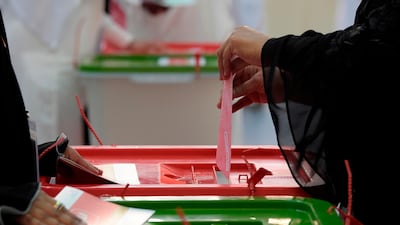Bahrain’s justice minister yesterday announced the first batch of results for the country’s parliamentary and municipal elections, a day after 67 per cent of the country took to the polls despite reported interference by Iran.
Sheikh Khalid bin Ali Al Khalifa announced the names of eight winning MPs, including two women, who will represent the capital in addition to Muharraq island and northern and southern governorates.
Sheikh Khalid also announced the names of seven new municipal representatives, one of whom is a woman.
The second round of voting to fill the remaining parliamentary and municipal seats will be held on December 1.
Prime Minister Prince Khalifa bin Salman Al Khalifa lauded the Bahraini population for its participation in the electoral process, Bahrain’s state-run news agency reported.
“I would like to say thank you to the people of Bahrain from the bottom of my heart for their continuous support for their country under all circumstances,” he said. “We hope that the next phase will be richer, brighter and safer for Bahrain and its people.”
He also warned of the danger of social media networks and messaging apps in disseminating fake news after officials announced that more than 41,000 suspicious messages were sent to voters urging them not to take part in polls.
“We have to be united in the face of that danger, and we should work to repel it,” he said.
Minister of State for Foreign Affairs Dr Anwar Gargash said on Twitter that Iran was to blame for “cyber interference in national elections”. Dr Gargash described it as “yet another area of Tehran’s nefarious activity in the region”. But, he said, the electoral process as a whole was a success despite attempts at interference.
“The high voter turnout and a national awareness regarding the importance of stability and the danger of foreign intervention fortifies Bahrain,” against such external threats, Dr Gargash said on Twitter.
Saudi Foreign Minister Adel Al Jubeir expressed similar sentiments on Twitter.
“The results of parliamentary and municipal elections in Bahrain in addition to a high voter turnout signals a categorical rejection of foreign intervention in domestic affairs and reaffirms the unity of the Bahraini population,” he said.
_______________
Read more:
Bahrain reports 67% turnout in parliamentary and municipal elections
Bahrain Elections: a push for political legitimacy
Bahrain receives pledge of support from GCC peers to help its economy
_______________
Meanwhile, the royal palace was preparing to receive Saudi Crown Prince Mohammed bin Salman, who was expected to arrive in Manama yesterday for the second leg of his regional tour ahead of the G20 summit in Argentina.
Bahrain’s foreign minister said that the visit represented the “profound historic relations binding the two brotherly countries and peoples”.
Several Bahraini newspapers dedicated significant space yesterday to the history of Saudi-Bahrain relations.
Ahead of the visit, Saudi Arabia sent a cable to congratulate the government on holding successful elections.
Earlier yesterday, Bahrain’s justice minister said the election elicited the largest turnout in the country’s history despite attempts to discourage people from voting.
“We heard about attempts to intimidate people to not go to vote but this was dealt with in time,” he said. The result, he said, showed people had “hope in the ballot box”.
“Citizens received 41,000 messages on Saturday urging them not to participate but people were aware and were not drawn [to believe] these messages … the people of Bahrain easily discovered the fabrication,” he said.
An Interior Ministry statement reported that the Directorate-General of Anti-Corruption, Economic and Electronic Security had uncovered Iranian links.
“The crime was committed by individuals in Bahrain and Iran in which they hacked a number of servers to carry [out] their illegal act … and legal procedures are being taken to refer the case to the public prosecution,” the ministry said.
At least six people were detained and charged before the vote for “obstructing the electoral process”, Bahrain’s public prosecutor said.
With turnout up 14 per cent on the vote four years ago, Sheikh Khalid said the increase was “based on the success of the 2014 elections and ensures a clear mandate for a parliament representing the diverse range of views in Bahraini society”.
This year’s election was seen as a test for the government looking to push economic reforms and stabilise the economy. Osama Abdullah al Absi, the head of Bahrain’s Labour Market Regulatory Authority, called for a national council that tracks the country’s economic challenges. It also came as the government seeks to move past the mass uprising after 2011, largely among members of the Shiite community.
In May last year, the Shiite majority Al Wefaq and the secular Waad parties were barred from the race.
The government denies preventing political discussion, saying that there are 16 political societies in the country and the majority registered candidates for this year’s vote.
But to avoid questions of political legitimacy, the government tried to rally Shiite voters to turn out despite a boycott called by two banned opposition groups. The government encouraged some candidates to run as independents to draw out Shiite voters.
Only 23 of the 40 incumbent MPs were seeking re-election.
Under the 2002 constitution, 40 citizens will be elected to the Council of Representatives. They will be joined by 40 royal appointees to Bahrain’s upper house or the Consultative Council. The upper chamber has the power to block legislation by the lower house.
The lower house has the authority to examine and pass legislation proposed by the king or cabinet and also has monitoring powers.

